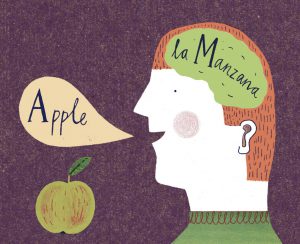Are you a foreigner? Have you already found your soulmate who does not speak in the same language to you? You two might be together and have a kid soon? If yes, you should definitely read this article to find out what would be the benefits of your child being raised in bilingual environment.
Benefits of being bilingual
Because of the internationalization trend nowadays, being bilingual definitely is an advantage when it comes to jobs. Most of employers prefer to hire employees with two or more fluent languages, and are willing to pay them a higher salary; but this is not the only perk. The brain gets advantages by speaking two or more languages from improved cognitive skills, which helps it develop denser grey matter, improve decision making skills, and delay the onset of dementia. This can be considered as brain training, which pushes your brain towards being more flexible.
Bilinguals vs. Monolinguals
The research of German-English bilinguals and monolinguals has shown that different language patterns affect the way the bilinguals react. In this research, German-English bilinguals were shown video clips of events with a motion in them, for example a woman walking towards a car or a man cycling towards the supermarket, and then they were asked to describe the scenes. The result was that German monolingual speakers tend to not only describe the action but also the goal of the action. So they would tend to describe those scenes like “A woman walks towards her car” or “a man cycles towards the supermarket”.
English monolingual speakers would simply tend to say as “A woman is walking” or “a man is cycling”, without mentioning the goal of the action. After all, German speakers tend to look at the event as a whole – on the other hand English speakers are more likely to zoom in on the event and focus on the action. The reason of this difference could be the linguistic basic in grammar. In English, speakers need to notice about grammatically mark events that are ongoing, by obligatorily applying the –ing morpheme: “I am taking shower and I cannot reply your message immediately” or “I was taking shower when your message delivered”. In German, the grammar does not have this feature.

In the next research with the group of German-English bilinguals, they have to repeat strings of numbers out loud in either English or German, keeping one language in the forefront of their minds during the video-matching task. When English was ‘blocked’, the bilinguals acted like typical Germans and saw ambiguous videos as more goal-oriented. With German blocked, bilingual subjects acted like English speakers and matched ambiguous and open-ended scenes. When they were surprised by switching the language of the distracting numbers halfway through the experiment, their focus on goals versus process switched right along with it.
Different language = different person
Bilinguals say that they feel like a different person when they use different languages because of the way of expressing their emotions. Dr. Athanasopoulos, whose research is published in the current edition of Bilingualism: Language and Cognition, said that, “As well as learning vocabulary and grammar you’re also unconsciously learning a whole new way of seeing the world. There’s an inextricable link between language, culture and cognition. If you’re learning language in a classroom, you are trying to achieve something specific, but when you’re immersed in the culture and speaking it, you’re thinking in a completely different way.”
References: http://theconversation.com/how-the-language-you-speak-changes-your-view-of-the-world-40721
http://www.incultureparent.com/2011/03/study-bilinguals-see-the-world-in-a-different-way/
